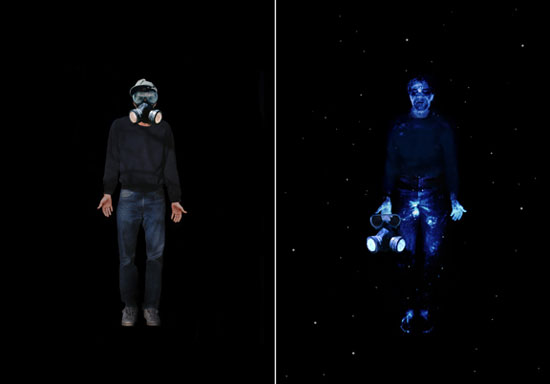|
Pesticides:Glowing Photos A photographer uses fluorescent tracer dyes and ultraviolet light to show how pesticides travel  Farmworker, 2002. Click here to see more of Tümer's photos. Photo: Laurie Tümer. Photographer Laurie Tümer shows the hidden paths of pesticides01 Dec 2005 Click here to see Tümer's photos. Photo: Laurie Tümer. The eye-opening exercise wasn't news to Laurie Tümer. The photographer has been making images that expose the presence of synthetic pesticides since 1998, when she suffered near-fatal poisoning after her New Mexico home was sprayed. While recovering, Tümer discovered a muse in the work of Richard Fenske, an environmental scientist at the University of Washington. Fenske uses fluorescent tracer dyes and ultraviolet light to demonstrate how pesticides can spread to agricultural workers' skin, even when protective gear is worn. By spraying tracers on her shoes and walking through her garden, or superimposing dyes onto landscape-scale canvases, Tümer uses a similar technique to illustrate how and where pesticides travel. The result of her work, a growing collection she calls "Glowing Evidence," is at once startling and stunning -- she compares the patterns in it to constellations. Critics who've seen her images exhibited in Santa Fe have called them eerie, compelling, ingenious, and haunting. Tümer's 25-year photographic career, including a current collaboration with a blind poet, has focused on "seeing the invisible," and was featured in a 2003 documentary of that name. But as work like hers becomes more visible, she says so-called political art is really nothing new. In fact, she traces her work to cave drawings. Like that ancient art form, Tümer says, her photographs are a forum for processing information, conveying dismay, and warning others. Click here to see a gallery of Tümer's photographs. http://www.grist.org/advice/books/2005/12/01/kloosterman/index.html# Pesticides: A Mother's View Pesticides: A Personal Letter Pesticides Cause Parkinson's Disease Pesticides: Body Burden Gasp of Horror--Human Subjects for Pesticide Testing: http://curezone.com/blogs/m.asp?f=309&i=125 When I first read this, my eyes widened, my mouth fell open and a gasp of horror escaped my lips: young adults, in a closed room, subjected to breathing in poison. Poison shot up their noses and into their eyes. Poison, known to cause nervous system damage, swallowed. NO, this is not some scene out of Dante's Inferno or the death camps of the Nazi Third Reich. These are experiments approved by the U.S. Environmental Protection Agency (EPA) to test pesticides on human subjects. Add This Entry To Your CureZone Favorites! Print this pageEmail this page |
CureZone Newsletter is distributed in partnership with https://www.netatlantic.com
Contact Us - Advertise - Stats
0.078 sec, (2)